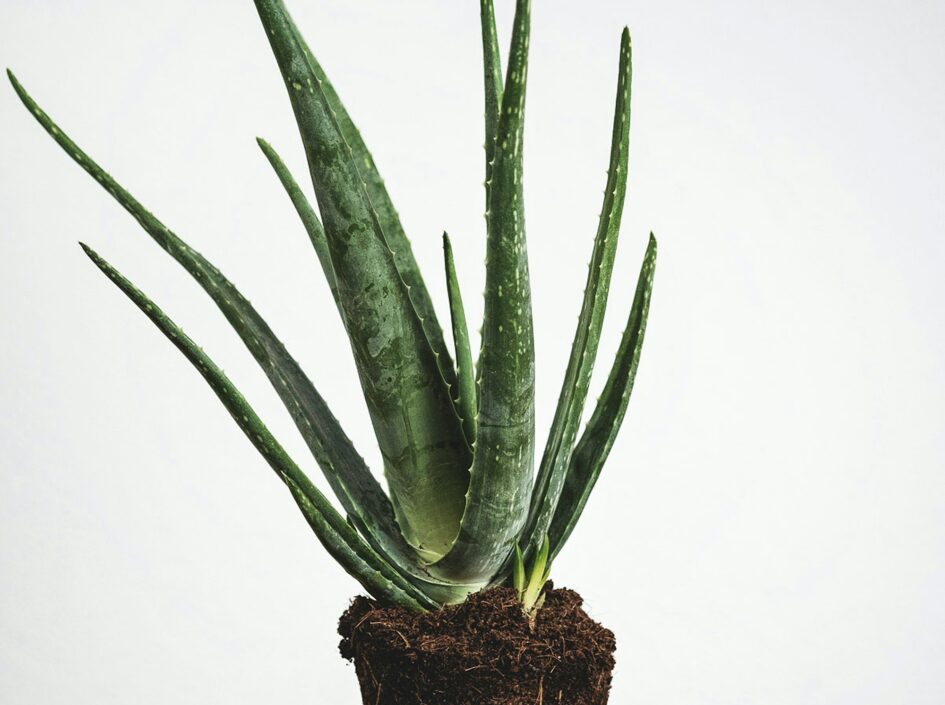Do you have an aloe vera plant in your house? You know the one — it looks a little like a cactus and does fine if you’re not good at remembering to water your plants. Do you treat it as decoration or do you use it for health purposes? If you’re only using it as decoration, you’re really missing out! The health benefits of this plant are extensive—some you have probably heard of, but some you likely have not. Read on to see how this humble little houseplant could change your life.
Skin Benefits
Did you know that one tablespoon of aloe vera gel ingested daily can improve skin elasticity within 90 days? This study was conducted on a group of women aged 30-59. What a great way to improve your skin in comparison to toxic topical products that are questionable at best. [1]
You have probably heard of topically applied aloe vera being good for sunburn. In fact, maybe you have even had a bottle of it in your medicine cabinet for overindulgence in the summer sun. But did you know that it is also extremely effective for all types of burns? It has been shown to help the skin accelerate the healing process by nine days for sunburn, radiation burns, and all manner of first and second-degree burns. This may be helpful if you or a loved one are ever faced with undergoing radiation therapy. [2]
In addition to being wonderful for burns, aloe vera is highly beneficial for all types of skin wounds. Whether it’s your child’s skinned knee or your mother’s post-operative wound, you can count on aloe to help speed the healing process.
Constipation
When the juice of aloe vera is dried, it is called aloe latex. This portion of the aloe plant has been found to produce a swift laxative effect in humans. In fact, it’s so potent that it is not considered something to be used on a daily basis but saved for a last resort. That being said, it may be something to keep in mind if you or a member of your household ever struggle in this area. Of course, a healthy diet packed with fiber and lots of water will go a long way to ensure that you don’t have to worry about needing aloe latex. [3]
Antimicrobial
In yet another study, aloe vera gel was found to be effective against several types of microbes. It’s likely that it’s effective against many, but the ones tested were candida albicans (think yeast infections of all kinds), staph (often looks like eczema but doesn’t respond to typical eczema treatment), and h. pylori stomach infection. If you’re dealing with any of these challenges, it may be worth looking further into aloe as treatment. It was also noted that aloe has potential for being used as a treatment in microbial infections that are drug-resistant. Aloe vera gel can be applied topically or ingested orally to treat microbes such as those listed here. [4]
Gut Health
Ulcers
If you have ever experienced a stomach ulcer, you know how painful they can be. But what if you could prevent a future occurrence? And have a safe, effective, and economical way to treat one if you should have a recurrence? Well, you don’t have to look any further than aloe vera gel. In a 2011 study, aloe vera gel was administered twice a day to patients with peptic ulcers. At the three-month follow-up, 93% of the patients were healed. The rate of healing in the conventional medicine group was a meager 42% by comparison. That’s pretty impressive! Another study conducted on rats showed that aloe vera gel prevented stomach ulcers when the normal means of inducing them in rats was applied. This suggests that the same may hold true for humans. You could certainly give this a try if you have concerns of developing ulcers. And you would reap all the other health benefits of aloe, too. [5] [6]
Bloating, Inflammation, and Leaking
The sugar in aloe vera gel, mucilage, has been shown to reduce inflammation of the gut lining. When this inflammation is reduced or eliminated, so is stomach bloating. Many factors can lead to the gut leaking to surrounding areas and causing inflammation. This, of course, can lead to a whole host of uncomfortable symptoms. This leaking is caused by gaps in the good bacteria that are supposed to confine certain molecules to the gut. Aloe vera gel contains good bacteria that fill in the gut lining and closes those gaps. When the gaps are closed back up, the body has a chance to heal the symptoms. You may also remember from other articles that upwards of 70% of human immunity lies in the gut. So, healing the gut in this way will go a long way in addressing immunity, allergies, and other related issues.
Heartburn
As for heartburn and excess acid, aloe vera very effectively neutralizes stomach acid and can be a gentle and effective way to combat heartburn. Something to note, however, is that most people who think they have too much stomach acid actually have too little. You may be one of them if you have tried antacids and they don’t help you. Aloe also may not help in this case. In this case, you would want to look into supplementing your stomach acid until your system regulates and help is no longer needed. [7]
There really is so much more that could said for the benefits of aloe vera juice or gel consumption. The juice, by the way, is just the gel mixed with water. If you want a more concentrated treatment, go for the gel. If you don’t have any specific conditions you wish to address but would still like to reap the general health benefits of aloe, the juice would be sufficient. If you’re not sure, stop in and talk with our staff; we’re always happy to help.
Sources:
- Effects of Aloe Sterol Supplementation on Skin Elasticity, Hydration, and Collagen Score: A 12-Week Double-Blind, Randomized, Controlled Trial – PubMed (nih.gov)
- The efficacy of aloe vera used for burn wound healing: a systematic review – PubMed (nih.gov)
- Effects of aloe vera on constipation | International Journal of Current Advanced Research (journalijcar.org)
- In vitro activity of Aloe vera inner gel against microorganisms grown in planktonic and sessile phases – PubMed (nih.gov)
- Effectiveness of Aloe Vera Gel in Chronic Ulcers in Comparison with Conventional Treatments – PubMed (nih.gov)
- (PDF) Anti-ulcer effect of Aloe vera in non-steroidal anti-inflammatory drug induced peptic ulcers in rats (researchgate.net)
- Efficacy and safety of Aloe vera syrup for the treatment of gastroesophageal reflux disease: a pilot randomized positive-controlled trial – PubMed (nih.gov)
The information provided here is for educational purposes only. None of the research or evidence presented here is intended as a substitute for consulting an appropriate healthcare professional. These statements have not been evaluated by the Food and Drug Administration. The products offered here are not intended to diagnose, treat, cure, or prevent any disease. If you believe that you may have a disease condition, please consult your healthcare practitioner before using this or any other dietary supplement.



